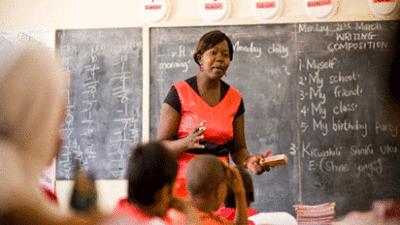
Teachers are the first set of people who give a child a sense of self or validation outside of the home. If they are successful at imparting their knowledge and building a child’s confidence in his or her abilities, or in encouraging a child to pursue certain skills or even dreams, then they would have had a positive impact on that child’s life.
Unfortunately, too few Nigerian teachers fall into this category of individuals who are driven by a sense of purpose, a desire to leave children, if not the world, better than they found them. How could our Nigerian teachers have this sense of responsibility, in a country that cares so little for them, where salaries are negligible if paid at all?
There is probably no other profession in our country today that is as undervalued as that of teaching. However, if the majority of people in Nigeria had access to quality education (especially at the primary school level) our country would be markedly different.
Teaching, like almost everything else in Nigeria, has become an all-comers affair where people with neither the qualifications nor the abilities find themselves as they search for something to occupy their time till something better comes along.
They cope with the poor salaries and their overall humble circumstance, in some cases by taking out their frustrations on their pupils or by entering into some immoral arrangements with parents. Situations whereby teachers accept “gifts” from parents in order to guarantee a child’s success are not unheard of.
The educator, like the journalist, is available for purchase and the society itself is a garage sale where everything can be bought at a discount, even those people or things who were once the backbone of the social order.
Backbone of the social order
So, if today our country and it’s people seem mostly corrupt and aimless, we must go back to our classrooms to figure out how we can help teachers retrieve their enthusiasm and to see their job as a calling rather than a dead end.
Teaching in the 21st century is about engaging an audience, bringing a subject to life and challenging even the most apathetic student to think critically and see the world differently rather than rehashing old debates or stereotypes.
I am afraid that no amount of reform can magically change the Nigerian teacher into something he hasn’t been trained or even himself been taught to be, by other teachers, as a young person. The social protection programme coordinated by Maryam Uwais (SA to the President on social protection) includes provisions for the hiring of 500,000 new teachers, which is all well and good, but I personally would like to know what yardstick will be used to measure these new recruits.
Will government be hiring more of the same tired individuals, whose broken spirits, assaulted by an unjust society, can only but produce more angry cynics like themselves? Or will we search for young people who hopefully, are not so tainted by the system and can conceive that their job is to be change-makers themselves by raising future citizens? Also, what methods will these new teachers use? Will they encourage students to think outside of the box and fall in love with their subjects, or will the classroom simply be a place of routine, missed opportunities and boredom?
When will we reform Nigerian education as a whole? What impact do we believe teachers should have on students? What sort of people do we believe this society needs: yes-men and ethno-religious bigots or inquisitive non-conformists who can re-assess the status quo?
What will be the new norms of the Nigerian society and how are educators, the police and journalists being prepped to teach, enforce and communicate them? How do we go about training our teachers to find a raison d’être beyond simply preparing students for the workforce? Can education in Nigeria be about socio-cultural development and preparing our youth not just for work but for life and active citizenship? With our current crop of teachers I would have to answer a resounding no.
The same issue as in the civil service then comes about: if those who have imbibed the old, nefarious ways which have gotten us nowhere cannot evolve and embrace new ways of thinking, what do we do with them?
It is the same in the police force: what does one do with the overweight, drunk policeman who has subsisted on bribery and corruption his entire life? What do we do with anyone really, in this new dispensation that cannot change?
I think, first of all, the option must be given to them. But those who cannot embrace critical thinking, creativity, being socially conscious and the notion of relationships based on more than a common language, religion or village, will eventually be left behind.
Sadly, more than half our population is still in the throws of illogical propaganda (occasionally causing them to defend or excuse ignoble acts) so we cannot, ultimately, abandon them. So there must be an urgent rescue mission or programme to tackle adult education, skills and corresponding values.
“Intelligence plus character, that is the goal of true education”, Martin Luther King Jr. once said. We cannot rebuild the Nigerian character without first of all restoring dignity to teachers and restructuring their training.
VANGUARD
END

Be the first to comment